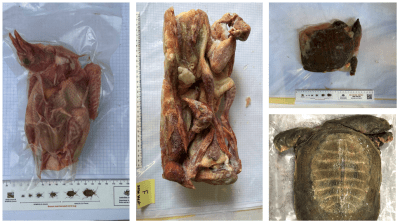The Department of Agriculture, Fisheries and Forestry says a significant risk to Australia’s biosecurity has been prevented after biosecurity officers detected and secured approximately 38 tonnes of risk material—including boxes of turtle meat, frog meat, plant products, avian meat, pig meat, beef meat, and raw prawns – from a Sydney warehouse.
 A biosecurity officer identified several suspiciously marked boxes leaving a premises while doing a routine inspection.
A biosecurity officer identified several suspiciously marked boxes leaving a premises while doing a routine inspection.
On 17 February 2023 departmental investigators executed a warrant at a warehouse in New South Wales where investigators located large quantities of meat products, plant products, soil and a range of vegetable products suspected to pose a biosecurity risk.
Following this, on 22 and 23 February 2023, the Australian Federal Police assisted the department by executing multiple warrants, at various locations in New South Wales.
On 15 February 2023, a Department of Agriculture, Fisheries and Forestry biosecurity officer noted suspicious boxes of goods at a routine inspection in New South Wales. The observations led to the department executing a warrant at a Western Sydney warehouse on 17 February 2023 where biosecurity risk products were uncovered.
Following this, on 22 and 23 February 2023, the Australian Federal Police assisted the department by executing multiple warrants at various locations in New South Wales connected to the warehouse. A number of warrants have been executed in relation to individuals and businesses in relation to the investigation.
At the western Sydney premises biosecurity officers diligently examined approximately 250 tonnes of goods and determined that over 38 tonnes represented a biosecurity risk, including beef, chicken, duck, pig meat, geese, frog meat, raw prawns, plant products, and soil.
Goods were removed from the site in seven twenty-foot shipping containers and remain under Department of Agriculture, Fisheries and Forestry control.
Departmental Secretary, and Australia’s Director of Biosecurity, Andrew Metcalfe AO said, anyone who intentionally tries to circumvent our biosecurity laws can face significant potential penalties of up to 10 years imprisonment and fines of up to $1,375,000 for an individual, or $6,875,000 for a company.
“The secured goods could have posed an unacceptable risk of introducing disease and pest for plants and animals alike,” Secretary Metcalfe said.
“In addition, diseases and pests from imported goods would severely impact our economy, and we will work hard to protect our agriculture industries and natural environment from these threatening diseases.
“The department takes its role in managing and enforcing Australia’s biosecurity laws extremely seriously and the work of our biosecurity officers throughout this operation has been outstanding.”
The investigation remains ongoing.
The Department will continue to collaborate with the Australian Federal Police, Australian Border Force, and all other relevant parties throughout the next phase of the investigation.
The illegal, commercial-scale meat-smuggling operation could have ripped a COVID-sized hole in the economy, NSW Farmers president Xavier Martin said.
Mr Martin said the 38 tonnes of turtle meat, frog meat, plant products, avian meat, pig meat, beef meat, and raw prawns seized by officials was likely “just the tip of the iceberg”, calling for more resources to defend Australia’s food production.
“The biosecurity officers who detected and seized these containers of material deserve to be praised for their efforts, but it does point to a major problem with our biosecurity system,” Mr Martin said.
“The very fact that seven twenty-foot shipping containers filled with illegal products slipped through our system is a big cause for concern.
“Smugglers seem to be treating our border controls like a lucky dip, hoping they can get away with it, so if the government can find billions for nuclear submarines and Olympic Games they can surely find the money to build a stronger biosecurity system.”
Last year, the detection of Foot and Mouth Disease fragments in imported pork products made headlines across the nation, following an outbreak of the disease in Indonesia. Experts warned the economic cost of an FMD outbreak in Australia would be comparable to the cost of the JobKeeper program, to say nothing of the blow to food production and tourism.
“The government’s own numbers estimate the potential cost of an FMD outbreak would be about $80 billion – and it’s not the only biosecurity threat out there,” Mr Martin said.
“Lumpy Skin Disease is also present in Indonesia, and we’re continuing to see efforts to eradicate Varroa mite impact beekeepers and the horticulture sector.
“Farmers have argued for stronger, long-term sustainably-funded biosecurity systems for years – it is absolutely critical the federal government lifts its spending in this space.”
Only a small portion of incoming freight was inspected by biosecurity officers, Mr Martin said, but he was hopeful state and federal governments could work together with industry to improve preparedness and response.
“We have strongly advocated for the federal government to boost screening and put in place a long-term, sustainable funding model for biosecurity efforts, which is especially needed given the financial woes the department is facing,” Mr Martin said.
“There is also the need for the federal government to work hand-in-hand with all states and territories, as well as other stakeholders, to ensure everyone knows exactly who needs to do what and when in response to a biosecurity threat.
“These threats are very hard to get rid of once they arrive, and they are incredibly costly, so it is far better for us to spend a little on prevention now than a lot on the cure later.”
Source: Department of Agriculture, Fisheries and Forestry, NSW Farmers

Why would Australia even think about importing any animal products
Please keep us updated on the progress of the investigation and further charges
so what were customs, now ‘border force’ doing? Why didn’t they stop the illegal items at the port? Like the mis-declared foetal blood and the bribed officer in qld a few years back – no one is actually inspecting anything it seems!